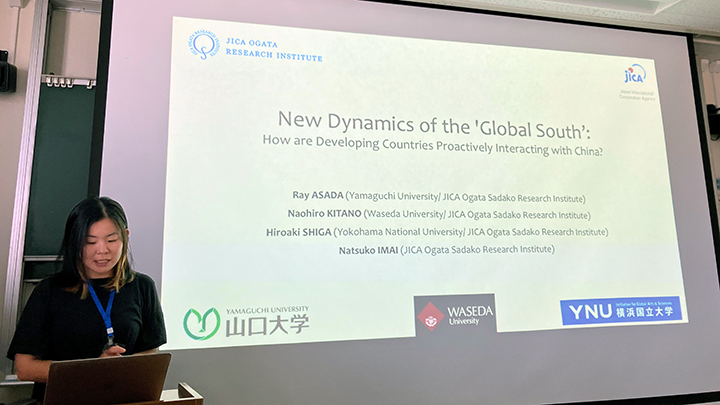Research Findings of the JICA Ogata Research Institute Were Presented at the 25th JASID Spring Conference
2024.10.18
On June 15, 2024, the 25th Spring Conference of the Japan Society for International Development (JASID) took place at Utsunomiya University. It focused on global and glocal human resource development, a practical implementation of international cooperation and co-creation through local initiatives. Below is a summary of the sessions that researchers from two research clusters at the JICA Ogata Sadako Research Institute for Peace and Development (JICA Ogata Research Institute) participated in.
Ohno Izumi, Senior Research Advisor, gave a presentation based on insight gained through the “Research Project on the Japanese Experience of Industrial Development and Development Cooperation: Analysis of Translative Adaptation Processes” in the organized session titled “Inquiring the Essence of ‘Japanese-style’ International Cooperation: Multi-faceted Considerations on Today's Role of International Cooperation” (Lead organizer: Yamada Shoko, Professor at Nagoya University and President of JASID).
Ohno’s presentation was titled “‘Japanese-style’ Cooperation in Industrial Development: from a Perspective of Translative Adaptation.” She first pointed out that while what is meant by the phrase “Japanese style” varies, industrial development is a field where uniquely Japanese characteristics can be found. She then raised an issue on the “style” of development cooperation, arguing that greater attention should be given to the methodology for learning and disseminating development policies (the how) rather than providing specific prescriptions (the whats). After reviewing how this Japanese style has been discussed in literature on industrial development to date, Ohno introduced “translative adaptation” as the perspective and methodology that Japan cultivated through its own experience of “catch-up” efforts and development cooperation. She then shared cases of policy dialogue, kaizen promotion and skill development as examples of Japanese-style industrial development cooperation based on translative adaptation. She closed the session with recommendations for enhancing Japan’s industrial development cooperation.
A special issue of the
Journal of Contemporary East Asia Studies
was published as an output of the research project “The New Dynamics of Peace and Development in the Indo-Pacific: How Countries in the Region Proactively Interact with China.” To explain the outline of research outcomes and have discussions, the roundtable titled “New Dynamics of the 'Global South': How are Developing Countries Proactively Interacting with China?” was held.
The roundtable started with a report from Kitano Naohiro, Senior Research Advisor, on the estimated amount of foreign aids provided by China (2001-2022). This was followed by a presentation by Asada Ray, Visiting Fellow, and Imai Natsuko, Research Officer. This presentation gave an overview of the research findings on bilateral relationships between China and the seven countries covered by this study (the Philippines, Laos, Sri Lanka, Bangladesh, Uzbekistan, Serbia and Zambia), as well as results from a survey on views on China and a media analysis in these countries. Discussion was then moderated by Shiga Hiroaki, Visiting Fellow, and various questions came from the floor. Active discussion took place on topics such as the similarities and differences between Chinese and Japanese development cooperation and the importance of having a deep understanding of domestic politics in aid-recipient countries.

Asada Ray, Visiting Fellow, JICA Ogata Research Institute, presenting at the roundtable

事業事前評価表(地球規模課題対応国際科学技術協力(SATREPS)).国際協力機構 地球環境部 . 防災第一チーム. 1.案件名.国 名: フィリピン共和国.

事業事前評価表(地球規模課題対応国際科学技術協力(SATREPS)).国際協力機構 地球環境部 . 防災第一チーム. 1.案件名.国 名: フィリピン共和国.

事業事前評価表(地球規模課題対応国際科学技術協力(SATREPS)).国際協力機構 地球環境部 . 防災第一チーム. 1.案件名.国 名: フィリピン共和国.

事業事前評価表(地球規模課題対応国際科学技術協力(SATREPS)).国際協力機構 地球環境部 . 防災第一チーム. 1.案件名.国 名: フィリピン共和国.

事業事前評価表(地球規模課題対応国際科学技術協力(SATREPS)).国際協力機構 地球環境部 . 防災第一チーム. 1.案件名.国 名: フィリピン共和国.
scroll